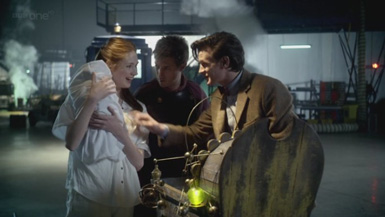TV Recap: Doctor Who – A Good Man Goes To War
Season 6, Episode 7
By Edwin Davies
September 3, 2012
One of the more common criticisms I have read of Doctor Who since Steven Moffat took over is that the series seems to have moved away from straightforward storytelling towards more oblique narratives. Rather than have every episode be relatively self-contained apart from the obligatory continuity from episode to episode, the show now hints at future events, leaving pieces of the puzzle for people to pick up and fit together themselves at the expense of the individual episodes. It's a criticism that I think is perfectly valid, and it certainly seems to fit the current season, which has leaned very heavily on cryptic clues and insinuation wherever its arc is concerned. I, for one, found "The Impossible Astronaut"/"Day of the Moon" two-parter a little hard to digest when I first watched it, and felt that it was more concerned with addressing the Silence arc from last series and setting up the current arc than telling a wholly satisfying story. It was still a lot of fun, but I didn't quite know what it was about.
However, "A Good Man Goes To War," which acts as both the mid-season finale and the first-half of a two-parter that will resolve when the show returns in the Autumn, justifies this model for the show by showing how well those disparate strands can be brought together. It seems clear that Steven Moffat knows where his story is going and that he wants the show under his reign to function more or less as a grand narrative consisting of smaller stories. Whether or not the way that The Doctor brought together figures from previous episodes to help him rescue Amy and Rory's baby, Melody, was part of a grand vision or just a case of him trying to give the impression of a grand vision is up for debate (I could have done without the souped-up WWII planes, personally) but I got the sense that Moffat is trying to do with Doctor Who what Joss Whedon has always done on his shows; create a consistent world in which characters can flit in and out without it feeling unnatural.
Anyway, that's enough theory, what about the episode itself? I thought it was pretty great, both as an individual episode and as a piece of the larger puzzle. On the individual front, it was a swift, pacey story that hit the ground running with a, quite frankly, fucking badass sequence in which Rory, bedecked in centurion armour once again, stared down a group of Cybermen (serving as a plot device rather than antagonists, which was nice considering how over-used they have been), asked them where his wife was, then relayed a "message" to them from The Doctor. And by message, I of course mean that more or less their entire fleet exploded. There are some episodes of Doctor Who that have me hooked from the get-go, and some that have to work at it. This was definitely the former.
From there, The Doctor and Rory assembled their super team which included a Sontaran, a lesbian Silurian and her human partner (which made for a "I'm surprised they snuck that on at tea time" sight gag about her lizard tongue), the blue, fat and old information and artefact trader Dorium (who I was sad to see killed off, because I like the idea of a character existing in that universe who can play off multiple sides to his own advantage, rather than the more stark archetypes that the series falls back on) and even the pirates from "Curse of the Black Spot". River Song (Alex Kingston) says that she can't help, though, because she knows that the Battle of Demon's Run will be the moment when The Doctor rises higher than before, only to fall, and it is also the moment when he discovers who she is (more on that in a moment).
Continued:
1
2




